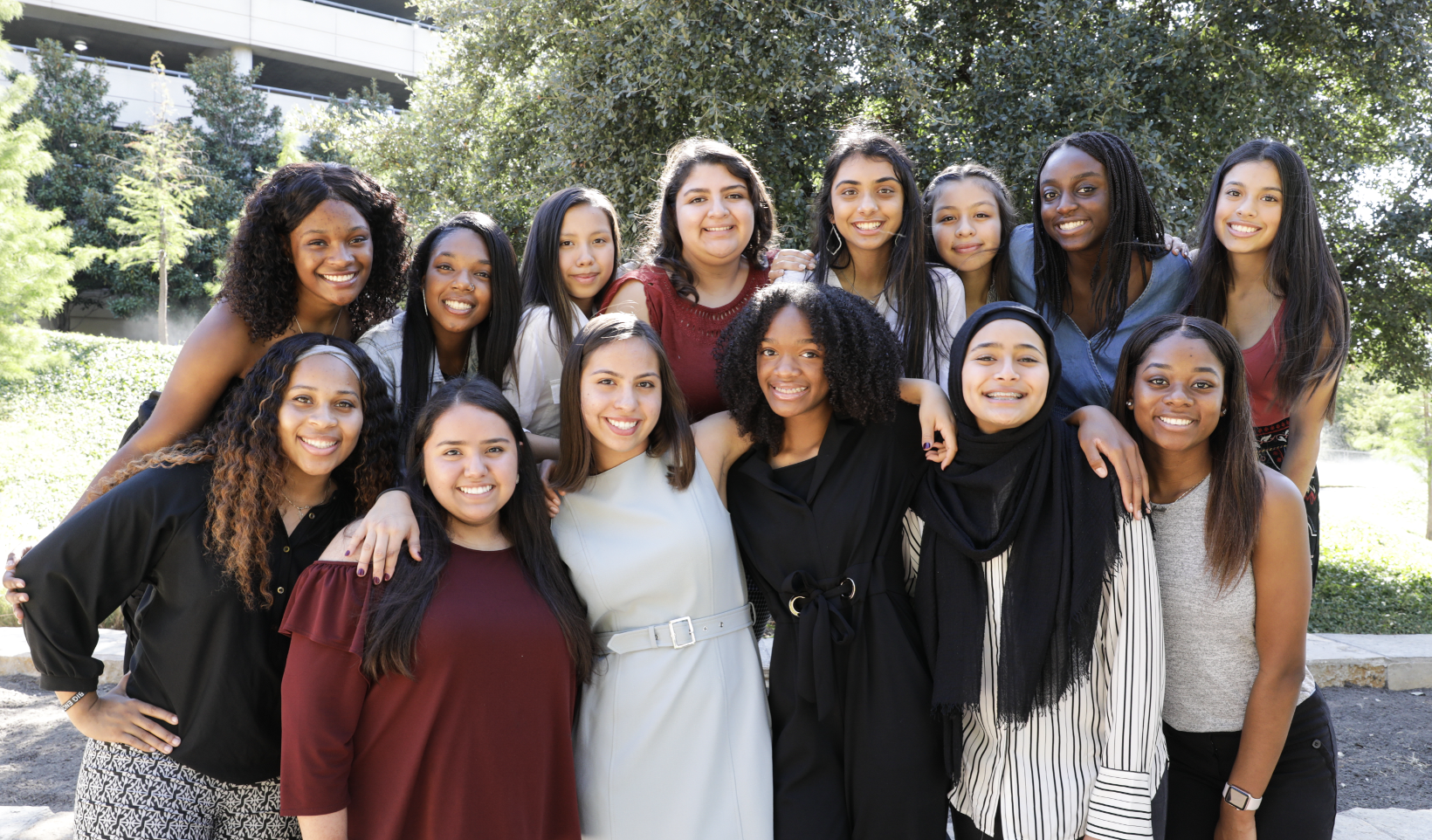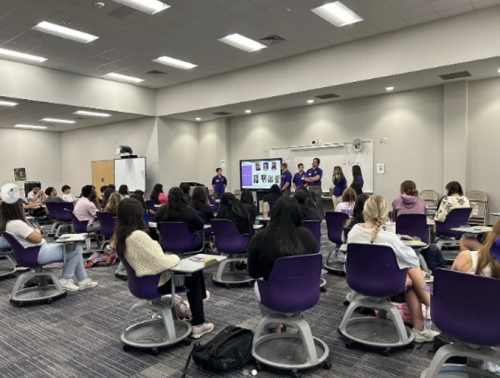November 20, 2025
Belonging in STEM: How the Pre-Health Professions Institute Shapes Young Scholars’ Futures
Through immersive experiences and relatable role models, students gain confidence to pursue careers in science, engineering, health care and beyond.

Kayla Thomas, top row, left, launched a program at the Texas Academy of Biomedical Sciences pairing undergraduate Horned Frogs with high school mentees. Photo by Amy Peterson
November 20, 2025
Belonging in STEM: How the Pre-Health Professions Institute Shapes Young Scholars’ Futures
Through immersive experiences and relatable role models, students gain confidence to pursue careers in science, engineering, health care and beyond.
When Radwa Mohamed ’25 was in high school, she was determined to become a physician assistant. As the daughter of immigrant parents unfamiliar with the U.S. education system, she often felt she was navigating the admissions process alone. That changed when she joined a mentorship program that introduced her to TCU’s Pre-Health Professions Institute.
“I never really had a role model to guide me through the college application process,” said Mohamed, who majored in biology as an undergraduate and has now applied to physician assistant programs. “I always felt like I had to figure out everything on my own, so being in this program exposed me to so many opportunities and resources.”
Her story is one of many shaped by the Pre-Health Professions Institute’s STEM mentoring and outreach programs, several initiatives designed to give middle and high school students, especially those from underrepresented communities, exposure to careers in science and health care with a goal of building excitement for college and ultimately pursuing a career in STEM.
Peer Power
Two factors drive Matt Chumchal’s work: addressing the physician shortage in Texas and nationwide and helping students succeed through mentorship — goals that are closely linked but distinct. The professor of biology and director of TCU’s Pre-Health Professions Institute channeled that energy into expanding access through the STEM mentoring programs.
To strengthen the initiative, he forged partnerships across TCU. Together, the Pre-Health Professions Institute, the Anne Burnett Marion School of Medicine at Texas Christian University and the Andrews Institute for Research in Mathematics & Science Education form a collaborative effort. The Joint Admission Medical Program, a pipeline created by the state Legislature in 2001 to make medical school more accessible to low-income Texans, provides some funding. Each fulfills a distinct role, united by a mission to help middle and high school students explore STEM and health care careers.
The results speak for themselves: Undergraduates who work with the Pre-Health Professions Institute to apply to professional schools are accepted at a rate more than double the national average, typically ranging from 80 percent to 90 percent each year.
On the ground, the initiative relies on mentors from both TCU’s undergraduate programs and its medical school, who are trained through the Pre-Health Professions Institute to connect with middle and high school students by giving presentations and working directly with them. Faculty present for the sessions are “flies on the wall,” Chumchal said.
“It doesn’t matter that we’re experts on something,” Ric Bonnell, assistant professor at the Burnett School of Medicine, said in a 2024 video highlighting the program. “Us interacting and trying to teach and communicate with high school kids is never going to be as good as [learning from] their near peers, who are college or medical students, who were sitting where they’re sitting just a few years ago.”
The Andrews Institute pitches in with logistics support and oversees research into the mentoring and outreach programs to “assess the attitudes and the perceived success of the program through the eyes of the mentors — and through the mentees,” said Molly Weinburgh, Piper Professor and the institute’s director.
Paving the Way
Kayla Thomas ’22 founded a mentoring program she dubbed Molding Melanin Magic after realizing how much she could have benefited from a mentor herself. To bring her vision to life, she applied in 2019 for an Experiential Projects to Impact the Community (EPIC) grant, a Pre-Health Professions Institute initiative that provides funds to support student-led projects.
“I thought if I had a mentor that was close in age to me, that looked like me, that was able to explain the ins and outs of some things that I didn’t understand while applying to college, it could have helped my transition and helped me to be prepared.”
Kayla Thomas
“I thought if I had a mentor that was close in age to me, that looked like me, that was able to explain the ins and outs of some things that I didn’t understand while applying to college, it could have helped my transition and helped me to be prepared,” said Thomas, who earned degrees in biology and child development at TCU and is now progressing toward a medical degree at William Carey University College of Osteopathic Medicine.
Although Thomas’ goal was to create a safe and empowering space for minority students pursuing STEM degrees, she says, the program is open to all students. It initially paired high school women mentees with undergraduate women mentors. It has since expanded to serve middle schoolers interested in science, medicine and related fields, connecting students at Thomas’ high school alma mater, Texas Academy of Biomedical Sciences, as well as W.A. Meacham Middle School.
Mentor sessions bring learning to life with guest speakers and practical experiences. Laura Luque, interim STEM scholar program coordinator and senior instructor in TCU’s College of Science & Engineering, shared her journey to becoming a biology professor. A physician assistant visited to teach students practical skills such as using a stethoscope and taking blood pressure.
Field trips have included visiting a simulation lab led by future Horned Frog physicians, touring the William E. and Jean Jones Tucker Technology Center and attending a Horned Frog baseball game.
“I think just doing [activities] like that, constantly showing up, constantly being there to listen … it’s been a really helpful part of the mentorship program,” said Rudaina Fattul, a senior biology major and president of mentors in Thomas’ program.
Fattul witnessed success firsthand with an eighth-grade student named Aliun. Having initially planned to enroll in a community college, she participated in the program and instead chose a science-focused high school as the next step in her academic journey. Later, she entered an art competition. “The prompt for the art competition was ‘draw your happy place,’ and she drew herself at TCU,” Fattul said.
Earlier this year, Weinburgh’s research team developed online surveys to evaluate Thomas’ program. The results, published in the National Association of Advisors for the Health Professions’ journal The Advisor in June 2025, highlight several factors behind the program’s success. Consistency and opportunities for off-task conversation — mentee-initiated questions unrelated to the lesson — proved valuable. Near-peer mentoring, which matches students with mentors of similar backgrounds and interests who are close in age, was also shown to be effective.
Weinburgh, who is also Andrews Chair of Mathematics and Science Education, said future studies will explore whether such mentoring efforts help address the limited pipeline of future physicians. Thirty-three of Texas’ 254 counties do not have a single physician, according to KERA. The Association of American Medical Colleges, meanwhile, estimates a shortage of approximately 124,000 physicians across the U.S. by 2034.
Building Belonging
Building on Thomas’ efforts, the Pre-Health Professions Institute expanded mentoring and outreach opportunities, gaining momentum in 2019. Thomas’ program “really provided a great model that we could learn from and replicate in other environments,” Chumchal said.

TCU Pre-Health Ambassadors speak to Paschal High Schools students about pursuing a pre-health track in college. Photo by Sarah Jung
The Burnett School of Medicine partnered with the institute in 2023 to create the Mini Med School summer program, a free, week-long camp featuring interactive learning on the TCU campus. Students got hands-on experience with dissections and suture practice on banana peels, explored HoloLens simulations and participated in one-on-one mentoring sessions. “We’re helping them understand what a physician does,” Chumchal said.
The institute also hosts several STEM outreach programs. These include TCU Fridays, in which pre-health students give presentations at local high schools; the TCU Pre-Health Kickoff, highlighting student organizations; and an “Envision your Future in College” event with campus tours and vision boards. The medical school, with some financial support from the institute, hosts Burnett at the BLUU, a come-and-go event with interactive clinical demonstrations, and a seminar on the dangers of smoking and vaping.
“We try to expose them to hands-on things to get them excited about STEM careers and medicine,” Chumchal said. “I think a big goal is just helping them feel a sense of belonging. That they belong in STEM, they belong in medicine, they belong in college.”
Reflecting their success in engaging students and fostering a sense of belonging in STEM and medicine, in spring 2025, Chumchal accepted the Recognition for Innovation in Outreach award on behalf of the institute. The award was presented by the Texas Health Education Service (TXHES) at the Texas Association of Advisors for the Health Professions Conference. TXHES leads statewide efforts to strengthen and streamline the pathways into the health professions.
Looking ahead, Chumchal said he hopes the STEM Mentoring and Outreach Programs will continue to grow, blending intensive events with after-school activities, reaching schools with larger student groups and developing more high-impact, research-based programs — ensuring that even more students feel there is a place for them in STEM, in medicine and in college.

Your comments are welcome
Comments
Related reading:
Research + Discovery
A Seat in the Lab
A TCU team takes a hard look at the university’s policies and practices to root out systemic bias.
Research + Discovery
Advancing Medicine
The Scholarly Pursuit and Thesis program gives students a competitive edge.
Features
As TCU Provost, Floyd Wormley Jr. Leads with Heart, Humor and Hard-Won Wisdom
The academic leader brings clarity, conviction and a scientist’s curiosity shaped by years spent balancing lab work, mentoring and a growing call to serve in higher education.